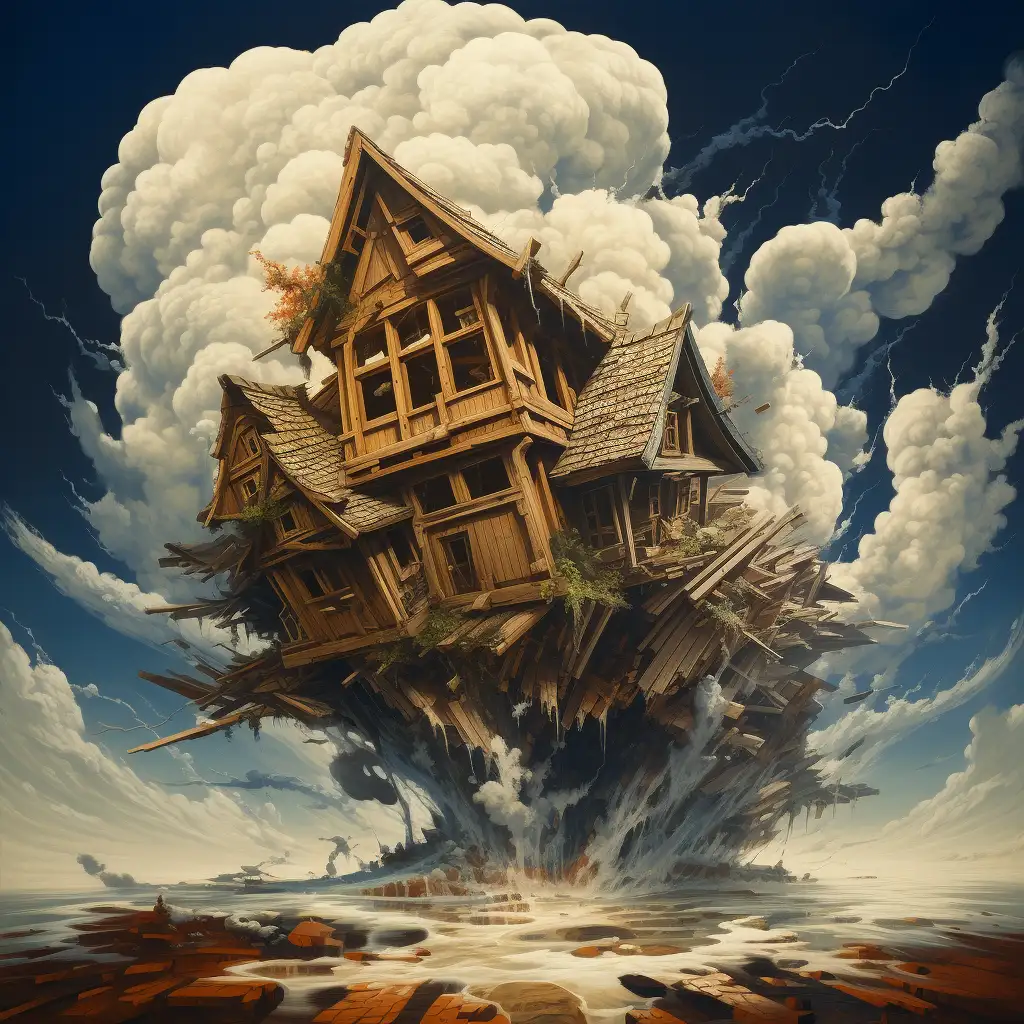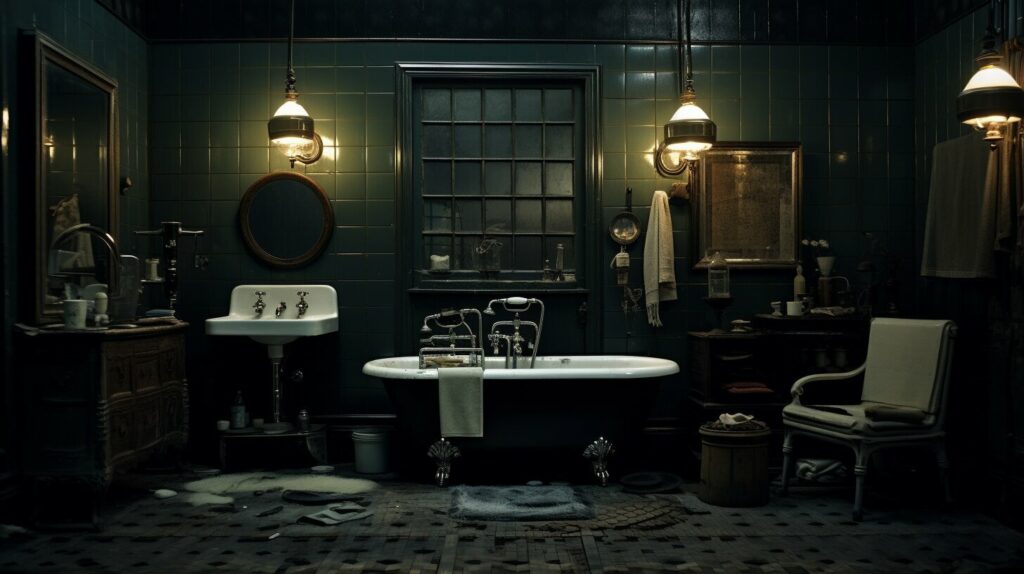Dreams about a house often symbolize the self or the dreamer’s mind. The different rooms and floors can represent various aspects of the individual’s psyche. For instance, the basement might symbolize repressed memories or emotions, while the attic could represent higher consciousness or forgotten memories. The condition of the house in the dream—whether it’s new, old, in disrepair, or being renovated—can reflect the dreamer’s current emotional state or personal growth. Cultural and personal factors also play a significant role in the interpretation of house dreams, as the meaning of ‘home’ can vary greatly.
Let’s now discuss this dream in greater detail…
Have you ever woken up from a dream, puzzled about the house you found yourself in? You’re not alone. Dreams have intrigued us for centuries, acting as a mirror of our subconscious. When you dream about houses, it can be a profound exploration into the deepest corners of your self.
Key Takeaways
2. Freud believed that dreams were a form of wish fulfillment, while Jung saw them as a means of addressing unresolved issues and achieving self-understanding and personal growth.
3. Neuroscience theories suggest that dreams help the brain make sense of random neural activity or process emotions and memories.
4. Houses in dreams symbolize a spectrum of meanings and interpretations, such as self-reflection, change, transition, and emotional intensity.
5. Keeping a dream journal can aid in remembering and capturing dream details for interpretation.
6. Dream interpretation is subjective, and while expert interpretations can provide guidance, the true meaning of a dream lies within the dreamer’s personal context and emotions.
7. Dream scenarios involving houses can include exploring unfamiliar rooms, renovating or decorating, feeling lost or trapped, and discovering hidden spaces, each carrying its own symbolic meaning.
8. Dreaming about houses can help uncover unresolved past issues and provide opportunities for healing and personal growth.
9. Dreams about houses can interweave with other recurring dream themes, allowing for a more comprehensive understanding of their meaning.
10. Sharing dreams with others can offer different perspectives and interpretations, enhancing the exploration of dream symbolism and meaning.
Understanding Dreams
Dreams as a Reflection of the Mind
Just as a beautifully written novel can captivate us with its intricate narratives and evocative imagery, so too can our dreams. Woven from the threads of our thoughts, emotions, and experiences, dreams can provide a unique lens through which we view our inner world.
It’s a widely held belief that our dreams reflect our inner thoughts, concerns, desires, and fears. This idea isn’t just based on anecdotal evidence; it’s supported by a rich history of psychoanalytical theory. Two of the most prominent figures in this field, Sigmund Freud and Carl Jung, contributed significantly to our understanding of dreams.
The Freudian Perspective
Freud, known as the father of psychoanalysis, believed that dreams were the “royal road” to our unconscious desires. According to Freud, dreams are a form of wish fulfillment, a way for our unconscious mind to express desires and thoughts that we might suppress in our waking life.
In his book “The Interpretation of Dreams,” Freud proposed that the content of our dreams, or the ‘dream work,’ is a transformation of our unconscious desires into a more acceptable or less distressing form, known as the ‘latent content’.
The Jungian Perspective
Carl Jung, a former student and colleague of Freud, took a somewhat different view. He saw dreams as a means for the psyche to communicate and find balance. Rather than seeing dreams as mere wish fulfillment, Jung believed that they could serve to address unresolved issues, explore future possibilities, and even tap into what he referred to as the ‘collective unconscious.’ Jung thought of dreams as a tool for self-understanding and personal growth.
The Neuroscience Perspective
Fast forward to the modern day, and neuroscience has introduced new perspectives on why we dream.
One of the leading theories is the Activation-Synthesis Hypothesis proposed by Harvard psychiatrists J. Allan Hobson and Robert McCarley. According to this theory, dreams are our brain’s attempt to make sense of random neural activity that occurs during sleep.
Moreover, the Information Processing Theory suggests that dreams could be the brain’s way of processing emotions and consolidating memories. This theory suggests that during REM (rapid eye movement) sleep, our brain sifts through the day’s experiences, deciding what to remember and what to discard.
In any case, whether we approach dreams from a psychological or a neuroscientific angle, it’s clear that dreams are a significant part of our mental landscape. Understanding them can give us valuable insight into our minds and our lives.
The Symbolism of Houses
The House as a Symbol
In the theatrical performance that is our dreams, many symbols take center stage. However, few are as captivating and layered as the humble house. Acting as a potent symbol in our nocturnal narratives, a house can represent a spectrum of meanings and interpretations.
The concept of a house is something we’re all familiar with. It’s a universal symbol, one that transcends cultural and geographical boundaries. Yet, the interpretations can be as diverse as the dreamers themselves.
In general, houses in dreams can represent the self, our mind, or our life circumstances. It could reflect our personal identity, mirroring our state of mind or our perspective on life. The different rooms might symbolize different aspects of our personality, and the condition of the house could reflect our current emotional state or self-esteem.
Personal and Cultural Influence on Symbolism
Yet, the beauty of dream interpretation lies in its flexibility. Despite the common symbols and themes, dreams are as unique as fingerprints, customized to the dreamer’s personal experiences and emotional landscape.
Your past memories and associations with houses will influence how you interpret the house in your dream. For instance, if you’ve always seen your home as a safe haven, dreaming about a house might bring a sense of comfort and security. Conversely, if your home life was chaotic, a house in your dream could evoke feelings of anxiety or unrest.
Cultural backgrounds also add a layer of richness to dream interpretations. Different cultures imbue houses with different symbolic meanings. For instance, in some cultures, the house is seen as a symbol of protection and maternal care, while others might see it as a reflection of social status or personal achievement.
Dream Houses: A Reflective Canvas
In essence, the house in your dream is a reflective canvas, capturing the colors and contours of your subconscious mind. The architectural details, the decor, the ambiance, and even the state of repair can offer insights into your inner world.
The journey through your dream house, therefore, can be an exploration into self-discovery, each room unveiling a new facet of your identity or life circumstances. It’s a narrative crafted by your subconscious, intended for you and you alone.
As we delve deeper into this intriguing symbol, remember that each house dream is a personal story. It’s an intimate narrative, woven from your thoughts, emotions, and experiences, waiting to be unraveled.
Types of House Dreams and their Interpretations
Dreaming about an Old House
Discovering an old house in your dreams might serve as a symbolic time machine, propelling you back to the past. This type of dream can evoke feelings of nostalgia and might be an invitation to reflect on past experiences or relationships that have shaped your identity.
Are there past issues or memories that need revisiting? Or perhaps lessons you’ve forgotten that need relearning? The old house in your dreams might be your subconscious nudging you to take a moment and embark on this reflective journey.
Dreaming about a New House
A dream about a new house is often indicative of change or transition. Just as a new house signals a fresh start in our waking life, it can similarly represent new beginnings in our dream world.
Are you moving through a significant shift in your life? This could be a career change, a new relationship, or even a personal transformation. The new house might symbolize your emerging identity, new aspirations, or the unfolding of a new chapter in your life’s book.

Dreaming about a House Falling Apart
If the house in your dream is crumbling or in a state of disrepair, it could reflect feelings of instability or insecurity in your waking life. A house represents security and stability, so a decaying house might suggest that these elements are compromised.
Consider this: Are there areas in your life that need some repair and attention? Perhaps certain relationships, your health, or even your self-esteem? This crumbling house might be your mind’s way of urging you to address these issues.
Dreaming about a Large House
A dream featuring a large or sprawling house can often signify personal expansion. Much like how a large house offers more room to move and grow, this dream might symbolize personal growth, abundance, or the exploration of different aspects of your personality.
A large house might also indicate that you’re feeling confident and ambitious, ready to embrace new opportunities. Alternatively, it could suggest you’re spreading yourself too thin and need to consolidate your energy.
Dreaming about a Haunted House
A haunted house in a dream can often be a manifestation of repressed memories or unresolved issues. The spectral residents of this house might symbolize fears, guilt, or traumas that are haunting you.
These dreams might be a signal from your subconscious that it’s time to confront these haunting aspects of your life. It’s an invitation to address, reconcile, and hopefully find closure on these unresolved issues.
Dreaming about a House on Fire
A house ablaze in your dream can symbolize intense emotions or transformative events. Fire is a powerful symbol, often representing transformation and renewal.
This blazing house could symbolize a need to let go and move on from the past. Just like how fire consumes the old to make way for the new, this dream might be nudging you towards releasing outdated beliefs or habits and embracing transformation for personal growth.
The Influence of Other Symbols in House Dreams
Your house dream does not exist in isolation. Like a complex painting, every detail contributes to the overall narrative, adding depth and nuance to the storyline. The people, objects, and even the ambiance within the dream can offer additional layers of interpretation.
People in the House
The presence of people in your house dream can provide significant clues. Are you alone in the house, or is it bustling with family members, friends, or even strangers? The interactions and relationships with these individuals can shed light on your interpersonal dynamics in waking life.
For instance, a crowded house might symbolize a busy mind or perhaps a feeling of being overwhelmed. In contrast, an empty house could denote feelings of isolation or a desire for solitude.

Objects in the House
Objects in the house also carry symbolic weight. They might be everyday items, like furniture or dishes, or they could be more unusual or surreal. Pay attention to these details; they could reveal something about your current state of mind or circumstances.
For example, a house filled with antique furniture might symbolize a longing for the past, while a house with modern decor might represent a forward-thinking mindset or a desire for change.
Specific Rooms in the House
Exploring specific rooms in your dream house can also reveal unique insights. Different rooms can represent different aspects of your personality or life.
The kitchen, for instance, might symbolize nourishment and creativity, while the bedroom could represent intimacy and rest. A cluttered basement might represent repressed memories or emotions, while an expansive attic might symbolize lofty aspirations or intellectual pursuits.
House Condition and Ambiance
The condition and ambiance of the house in your dream can also offer meaningful interpretation cues. A brightly lit house might represent clarity and understanding, while a dark house might symbolize confusion or mystery.
Similarly, a well-maintained house might reflect a sense of order and self-care in your waking life, whereas a dilapidated house might indicate neglect or a need for self-healing.
Remember, your dream house is a narrative woven by your subconscious, combining various elements of your experiences, emotions, and thoughts. Each detail, no matter how insignificant it might seem, can offer a new perspective into this symbolic narrative.
How to Remember and Interpret Your Dreams
Remembering and interpreting dreams can often be as fascinating as the dreams themselves. It’s like being both a detective and an explorer, investigating the hidden corners of your subconscious mind. Let’s delve into some practical strategies and insights to aid you on this journey:
Remembering Your Dreams: The Dream Journal
Having a dream is one thing but remembering it can be quite another. One useful tool for capturing these elusive nocturnal narratives is keeping a dream journal. This can be a physical notebook or a digital app, whatever feels more comfortable and accessible for you.
Here are a few steps to start your dream journaling practice:
- Keep your dream journal close: Have your journal nearby when you go to bed, ideally on your bedside table. The aim is to write down your dreams as soon as you wake up when the memories are still fresh.
- Jot down everything you remember: Write down as many details as you can remember, no matter how seemingly insignificant. Note the people, places, objects, emotions, and even colors or sounds.
- Note the date: Recording the date can help you identify any patterns or recurring themes over time.
- Don’t worry about coherency: Dreams often don’t follow a logical sequence, so don’t worry about making your entries perfectly coherent. The important thing is to capture as many details as possible.
Interpreting Your Dreams: A Journey of Self-Discovery
Once you’ve remembered and recorded your dreams, the next step is interpretation. It’s important to note that dream interpretation isn’t an exact science. It’s more of an art, a journey of self-discovery that’s unique to each individual.
Here are some tips to guide your dream interpretation process:
- Consider your personal context: Your personal feelings, experiences, and circumstances play a significant role in dream interpretation. Your unique life context gives color and meaning to the symbols in your dreams.
- Listen to your intuition: Often, your gut feeling or initial reaction to a dream symbol can provide valuable insights. Listen to your intuition; it’s your subconscious communicating with you.
- Don’t be afraid to diverge from conventional interpretations: While common dream symbols can provide a useful starting point, don’t be afraid to diverge from them if they don’t resonate with you. Remember, your dreams are uniquely yours, and so are their interpretations.
- Look for patterns: If you notice recurring symbols, themes, or emotions in your dreams, pay attention. These patterns could highlight important issues or themes in your waking life.
Expert Interpretations
Leading psychologists and dream experts have long delved into the fascinating landscape of dreams, offering invaluable insights into our subconscious narratives. Particularly when it comes to house dreams, these experts provide intriguing perspectives.
Houses as Psychological Mirrors
A consensus among many dream scholars is that the houses we see in our dreams often mirror our psychological states or stages of life. These structures, whether they’re humble cottages or sprawling mansions, reflect aspects of our inner self and life journey.
For instance, Carl Jung often interpreted houses in dreams as symbols of the dreamer’s mind. He believed that different parts of the house could represent different parts of the dreamer’s psyche.
Interpreting Different Types of Houses
Experts provide general interpretations for different types of house dreams, giving us some direction in our own personal exploration. For example:
An expansive mansion might suggest personal growth, ambition, or the widening of one’s perspective. This could be an indication of your expanding self-awareness or personal aspirations.
A rundown house, on the other hand, might signal neglect of self-care or emotional wellbeing. It might be your subconscious nudging you to pay attention to areas of your life that you have been neglecting or aspects of your self that need nurturing.
A house filled with many rooms could symbolize the complexity of the self. Each room might represent a different aspect of your personality, memory, or experience, signifying the multidimensional nature of human identity.
Your Unique Interpretation
While these interpretations from dream experts provide a useful starting point, they are just signposts on the journey of dream exploration. Remember, the house in your dream is constructed by your subconscious, using the bricks and mortar of your personal experiences, feelings, and perceptions.
The true essence of your dream’s meaning will be uniquely tailored to you, resonating with your personal life story. Like a bespoke suit or a custom-made dress, the meaning fits you and you alone. So, while expert interpretations are helpful, the key to unlocking your dream’s true meaning lies within you.
Dream About House: Conclusion
There’s no denying that dreams can be an insightful journey into the unknown, and house dreams are no exception. Your personal context and emotions are crucial to deciphering these nightly narratives. As you start to see patterns and symbols emerge, you’ll begin to unravel the deeply personal and transformative language of your dreams.
Dreaming about houses, then, can be a window into your self, a key to unlocking your inner world. It’s an adventure of introspection and discovery, offering insights that can guide you on your waking journey. So next time you find yourself in a house of dreams, pay attention. You never know what doors you might open.
Remember, dream interpretation isn’t about finding ‘right’ answers but rather insights that resonate with you. So keep an open mind, enjoy the process, and most of all, sleep well. Your dream house awaits.
FAQs
A: Houses often symbolize different aspects of our lives, such as our personal identity, emotions, relationships, and aspirations. Dreaming about houses can reflect our inner desires, fears, or the need for stability and security. Exploring these dreams can provide valuable insights into our subconscious thoughts and experiences.
Q: What are some common dream scenarios involving houses?
A: Dreams about houses can take various forms. Some common scenarios include exploring unfamiliar rooms or secret passages, renovating or decorating a house, being lost or trapped in a house, or even discovering hidden rooms or forgotten spaces. Each scenario carries its own symbolic meaning.
Q: Can dreaming about houses predict the future?
A: Dreaming about houses is generally not considered a means of predicting the future. Instead, these dreams offer a window into our subconscious mind, revealing underlying emotions, desires, and experiences. While they may provide insights into our current situation, they do not necessarily forecast specific events.
Q: Are recurring dreams about houses significant?
A: Recurring dreams about houses can indicate unresolved issues or recurring themes in your life. They may point to areas that require attention or changes that need to be made. Paying close attention to the details and emotions in these dreams can help you identify patterns and understand their significance.
Q: Can I control my dreams about houses?
A: While it’s not always possible to control what we dream about, keeping a dream journal, practicing mindfulness, and setting intentions before sleep may increase the likelihood of dreaming about houses or influencing the content of your dreams. Lucid dreaming techniques can also provide some degree of control over dream scenarios.
Q: Should I be concerned if I have disturbing dreams about houses?
A: Disturbing dreams about houses can be a reflection of unresolved emotions, fears, or anxieties. It’s important to approach these dreams with curiosity and self-reflection rather than fear. If these dreams consistently cause distress or significantly impact your well-being, seeking support from a qualified professional, such as a therapist, can be beneficial.
Q: Can dreams about houses have positive meanings?
A: Absolutely! Dreams about houses can carry positive meanings as well. They can symbolize personal growth, a sense of security, harmony in relationships, or the fulfillment of desires. Exploring these dreams with an open mind can help uncover positive messages and insights from your subconscious.
Q: Are there any practical steps I can take based on the messages in my dreams about houses?
A: Absolutely! Once you’ve interpreted your dream and gained insights from it, you can take practical steps to address any underlying messages. For example, if you dream about renovating a house, it could symbolize a need for personal growth or making changes in your life. You can then actively seek opportunities for self-improvement or initiate positive changes based on these insights.
Q: Can dreams about houses reveal unresolved issues from my past?
A: Yes, dreams about houses can serve as a window into unresolved issues from your past. They may bring to light memories, experiences, or emotions that you haven’t fully processed. Exploring these dreams can help you recognize and address lingering issues, allowing for healing and personal growth.
Q: Can dreams about houses provide guidance for important decisions?
A: Dreams about houses can offer valuable guidance for decision-making processes. These dreams may present scenarios that represent different options or paths in your life. By analyzing the details and emotions within the dream, you can gain insights and a deeper understanding of potential consequences or desired outcomes, helping you make more informed decisions.
Q: Can dreams about houses be connected to other recurring dream themes?
A: Absolutely! Dreams about houses can intertwine with other recurring dream themes, such as water, flying, or animals. These themes often reflect different aspects of your life and emotions. Paying attention to the connections between recurring dream themes can help you uncover deeper layers of meaning and gain a more comprehensive understanding of your dreams as a whole.
Q: Can I share my dreams about houses with others for interpretation?
A: Sharing your dreams about houses with others can be a wonderful way to gain different perspectives and interpretations. Friends, family, or online dream communities can offer insights and alternative viewpoints that may help you uncover hidden meanings. However, keep in mind that dream interpretation is subjective, so ultimately, trust your own instincts and intuition when exploring the messages from your dreams.





